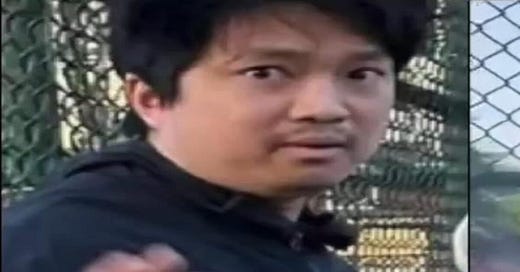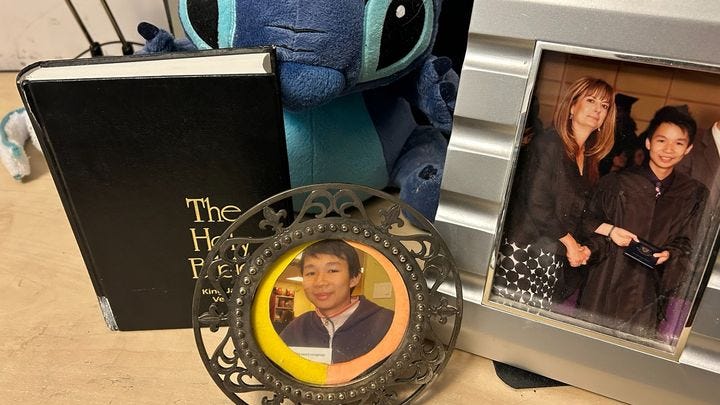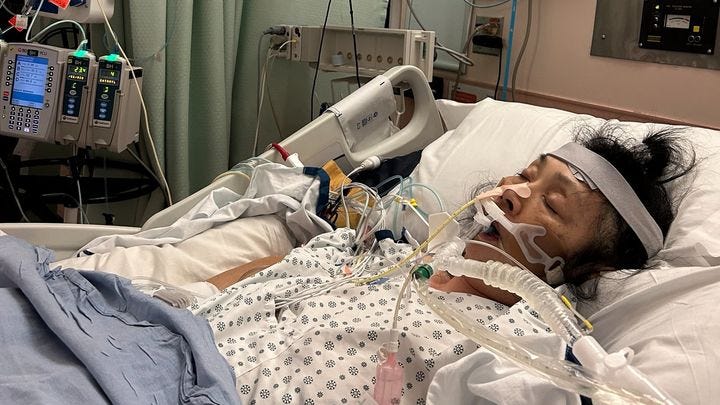The Banality of Random Mass Murder
Should we pity Kai-Ji Adam Lo, who went crazy after his brother was murdered?
Hey Folks,
As many of you will be aware, some crazy person killed a bunch of people in Vancouver yesterday, seemingly at random.
The alleged killer’s name is Kai-Ji Adam Lo, and early signs point to this attack being the result of severe mental illness.
Apparently, Kai-Ji’s brother was randomly murdered by a stranger last year.
Some time later, his mother apparently attempted suicide as she mourned the loss of her son.
Of course, I'm not making excuses for Kai-Ji Adam Lo. He murdered a bunch of people who had never done him any wrong.
When I first heard the news, it barely registered with me emotionally. I wondered whether it was some kind of psy-op meant to affect the result of tomorrow’s election. Plus, compared to all the kids being slaughtered in Gaza, are 11 deaths in Vancouver really that big a deal? .
It was only when I read Rozali’s take on it that I realized how sad it is that I’ve become desensitized to random acts of mass murder. I’m guessing I’m not alone here.
I hate to say it, but this latest mass murder is sort of a sign of the times. This tragedy seems to have stemmed from another tragedy, which is a chilling thought. Will this tragedy lead to others?
Although this might seem like a senseless act, Rozali manages to find some sense in it. Violence begets violence, apathy begets apathy, and nihilism begets nihilism.
What is to be done? I don’t know. But if you ask me, people aren’t going crazy and killing people for no reason. Things like this are symptoms of a societal sickness.
Crow Qu’appelle
Revisiting the New Normal Nihilism
Vancouver mass casualty event in the wake of societal alienation
Two years ago I wrote about what I called “new normal nihilism” in light of the rise of unprovoked stranger attacks across the country. In my concluding sentence I wrote:
“I suspect it will only get worse before it gets better.”
Unfortunately I think we’re at the “it’s gotten worse” phase.
Yesterday, Saturday, April 26, shortly after 8pm, a man driving a black Audi SUV plowed into a crowd at Vancouver’s Lapu Lapu street festival, killing 11 people (as of this writing) and injuring countless others. It is what officials are calling the “Darkest Day” in the city’s history. The 30-year-old driver has been identified as Vancouver resident Kai-Ji Adam Lo, which the police say has a “significant history” of interactions with police and health care professionals. Lo was allegedly picked up and released by police the night before the attack.
Sadly, Adam Lo experienced his own loss when his brother, Alexander Lo, was murdered last year in what was the first homicide of 2024 in Vancouver. This homicide was shrouded in mystery, as the murderer, 39-year-old Dwight William Kematch, did not previously know Alexander Lo.
Adam Lo created a GoFundMe for his brother describing his murder as a “senseless act of violence, something we never saw coming.”
Ironically it is now Adam Lo who is responsible for what is described as a ‘senseless act of violence’ on a far greater scale.
Months later, Lo created another GoFundMe fundraiser for his mother who attempted suicide in the wake of his brother’s murder. He says that his mother is the only family member he has left and describes the reasons for her attempted suicide:
“This is due to several things: the sudden passing of my brother and that she has immense bills to pay and has struggled for a long time due to high interest rates, such events have compounded the stress and negativity for her.”
Alexander Lo’s killer, Dwight William Kematch, was allegedly suffering from his own mental health issues as well, threatening a number of people online shortly before he killed Alexander. He was charged with second-degree murder.
It is a devastating domino effect, starting with Dwight Kematch killing Alexander Lo, and ending with his brother, Adam Lo, killing almost a dozen innocent people ranging from 5 to 65 years-old.
Vancouver police claimed stranger attacks have been on the decline since 2021, basing their conclusion on a random sampling of crime data over a couple years, but the reality is, accurate data on unprovoked stranger attacks is not readily available, making it difficult to accurately assess.
Many people are already banging on the mental health drum, saying more mental health support services are needed. I don’t disagree with this, but the services themselves are often woefully inadequate, and more importantly, I think we are well past the point of redirecting deeply troubled people to mental health support, especially those with past trauma and other factors that render them incapacitated. As we’ve seen with MAiD, many people would rather die than continue to suffer from the difficulties that come with living in the world today. The idea that mental health treatment will solve these issues is reminiscent of those who think talk therapy is a magic bullet. The problems we face are much more complex and require multi-pronged solutions—and these problems are impacting Canadians everywhere.
With this in mind, below, I share the piece I wrote about the rise of stranger attacks and acts of violence across the country that I think still resonates today:
New Normal Nihilism
On Sunday, March 19, 2023, a 37-year-old man was stabbed to death outside a Starbucks in downtown Vancouver as his wife and daughter looked on in horror. A TikToker by the name of Alex Bodger (who goes by Gora Pakora on TikTok) recorded the final moments of the victim’s life.
The incident itself was horrific for obvious reasons, but it laid bare more disturbing trends.
For one, Alex, the TikToker who stood by and recorded the stabbing later took a selfie next to the victim’s body, and even returned to the crime scene the day after to level up his social media game.
After the incident Alex said,
“Yeah, this s — [the stabbing], it doesn’t faze me too much,” he said. “I’ll just say human life to me, the way I look at it, if I don’t know you, it’s meaningless, it’s meaningless. I’m just keeping it straight up.”
No worries about the loss of human life, Alex is just “keeping it straight up.”
Alex isn’t the only one who behaved with disgusting indifference to human life.
In the video, a witness can be seen on the patio of the Starbucks taking a sip of his drink as the victim, Paul Stanley Schmidt, bleeds out just a few steps away.
Paul died because he asked Inderdeep Singh Gosal, the 32-year-old man who killed him, not to vape around Paul’s child.
This incident laid bare the callousness that people have for human life – not just the murderer who ended Paul’s life over a simple request not to vape around Paul’s child, but also the TikToker who recorded the entire incident and shared it online for clicks, and the man who continued drinking his coffee as if it was just another typical day in downtown Vancouver.
After this incident, a number of people attributed the inaction of witnesses to the bystander effect which states that the more people who are present in an emergency situation, the less likely it is for witnesses to step in and help. But this incident goes far beyond simply not helping. Not only did people not intervene, but they actively exploited the incident and either leveraged the situation to further their own agenda, or sat back and watched with a disturbing sense of nonchalance and acceptance, like the man who continued sipping his drink as he witnessed a man die in front of him.
Weeks later, a 17-year-old was stabbed and killed on a Surrey transit bus in another unprovoked attack.
Random attacks like these are no longer rare.
Indeed, while violent crime is decreasing in Canada, unprovoked violent attacks are actually increasing at alarming rates all over the country.
A statement released by the Vancouver Police in October 2021 reads:
“Over the last few months, we’ve noticed what appears to be an uptick in unprovoked stranger attacks. . . Over four people a day are the target of a random, unprovoked assault.”
In the last year, 1,705 people had been the victim of an unprovoked attack.
Saskatchewan, Newfoundland and Labrador, and the Yukon are also seeing higher rates of “more intense” crime. Edmonton and Toronto city officials also reported a marked spike in public attacks.
A survey conducted by the Leger and the Association for Canadian Studies found that two thirds of Canadians believe violent crime is worse than it was before Covid. 1 out of 5 respondents said they feared for their safety in the last six months.
Canada is not alone; the United States is seeing the same trends of increased unprovoked attacks though the weapon of choice differs.
In Illinois, a 79-year-old man shot and killed his neighbour over an argument of the victim’s use of a leaf blower in his yard.
In North Carolina, a 24-year-old-man shot a 6-year-old girl and her parents after a basketball rolled into his yard and the family went to retrieve it.
In upstate New York, a 20-year-old woman was shot and killed by a homeowner after her friend mistakenly pulled into the wrong driveway.
As of this writing, a 29-year-old man in Texas paused his date to shoot and kill a fake parking attendant. The attacker allegedly told his date “everything was fine” after returning to the restaurant from the parking lot where he killed the man. I guess he thought losing 40 bucks was reason enough to end someone’s life.
All of these incidents took place within weeks of each other.
This is the New Normal nihilism.
While random acts of violence aren’t new, they have been on the rise. In many places, random acts of violence are increasing, reverting a decades long trend of decline in stranger attacks.
What do the influx of random acts of violence say about us and where we are headed?
For one, it might say something about our collective sense of nihilism that has progressively gotten worse post-Covid. Some attribute the sudden rise of stranger attacks to Covid lockdown policies which contributed to more loneliness, isolation, insecurity, mental instability, and so on. While society has always been encumbered by violence and crime, Covid has hurtled us closer toward this gnawing sense of meaninglessness and uncertainty.
Disciples of progress and rationality like the Steven Pinker’s of the world may argue that we are living in the most prosperous period in human civilization; they’d say we are living longer; that we are objectively safer than ever; and that we are living in the Information Age, a period marked by constant advances in technology that simplify our lives (or so is the claim). They might even tell us that despair or pessimism is not helpful, and that – all things considered – everything is pretty good, including in developing countries where more people are being lifted out of poverty.
But all is not well.
We may be living longer, but has our quality of life improved? Are we any more happier or fulfilled than we were 10, 20, 40 years ago?
I suspect this sense of disillusionment has been brewing for some time due in part to our lack of conviction and meaning in modern society, and Covid has merely exacerbated it. Slowly, and then suddenly we have entered the New Normal Nihilism era where nothing really matters, least of all human life.
In ‘May We Live in Fleeting Times,’ I wrote about conviction scarcity in today’s modern world:
“Those who lack conviction exist in the in-between. When we have no convictions, no strong beliefs, anything is then acceptable. Fetishes must be accepted and affirmed. Morally questionable lifestyles are validated. Mental illnesses must not only be normalized, but celebrated. We’re told that truth is subjective. There is no capital ‘T’ truth, only small lower case ‘t’ truths. And everyone’s truths must be affirmed. But how are we to develop a framework in which all of us can co-exist if everyone is simultaneously correct in their truth?
Convictions are an antidote to alienation. They allow us to take personal responsibility for our own actions and to regain agency over our lives.
They force us to reflect on what gives our lives meaning. They can either make us retreat further into ourselves, or they can help free us from our shackles to the Wasteland.”
Canadian philosopher Charles Taylor said that humans are “striving for meaning and spiritual direction” and that our behaviour is a reflection of our search for meaning and recognition. What happens when these needs aren’t fulfilled? While the search for meaning has long been a staple of the human condition, it seems as if this sense of meaningless is permeating all aspects of society. Post-modernism breeds meaningless, and a society in which ‘nothing is true’ and ‘everything is permitted’ naturally results in a cultural relativist framework in which truth is relative and morality does not exist, at least not in a universal sense. Morality doesn’t dictate action, but lived experience does.
But if we are able to co-exist, we must abide by common truths, or a common foundation in which to live.
Unfortunately, such common truths no longer exist, and with the loss of foundational truths that would otherwise preserve society, we are at great risk of collapse.
What it means to be human is just as much a reflection of our present environment as it is with our past. We must go beyond graphs and data to get a richer understanding of the human condition and the importance of finding meaning.
Without conviction or meaning we allow nihilism to metastasize and grow like a sickness, leaving us with fleeting moments of gratification that barely sustain us.
How this will play out is yet to be seen, but I suspect it will only get worse before it gets better.












I can sympathize with the victims of actual unprovoked attacks.
the shooting of the guy stealing money as a fake parking attendant wasn't unprovoked though. the thief should've been well aware he was risking his life through thievery.
rather than asking if the loss of $40 justified a bullet, a better question would be for the thief: is your life worth the illicit gain of $40?
I've been rather aggravated over the last few years by similar framing blaming those who've lost property for defending it instead of blaming those who were committing criminal acts at the time they were ended.
As someone who recently was stalked by a schizophrenic guy for 15+ minutes while walking downtown my sympathy towards the mentally ill has dissipated. I am a big dude so funnily he kept his distance while threatening me and accusing me of murder. This never happened to me in the 1980s to early 2000s. And I have had friends attacked or harassed by the drug addicted and mentally ill.
The balance between 1980s three strikes and 2020s let anything go has to be found.